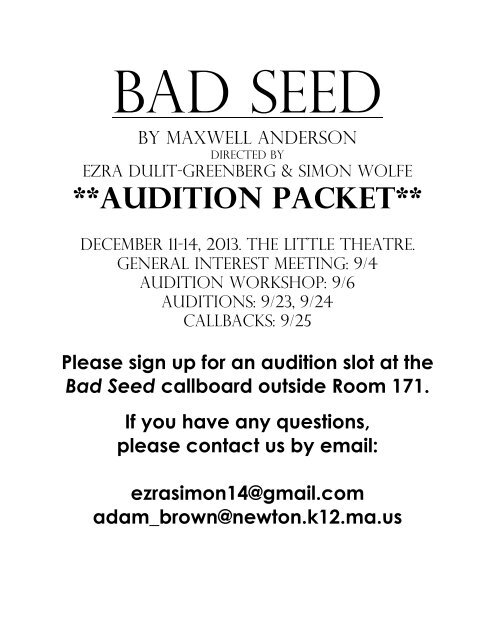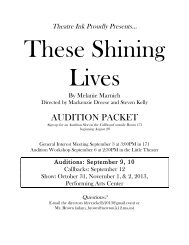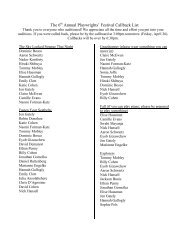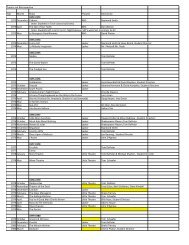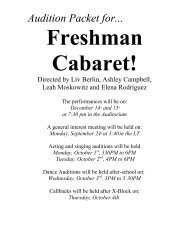Bad Seed
Audition packet - Theatre Ink
Audition packet - Theatre Ink
- No tags were found...
You also want an ePaper? Increase the reach of your titles
YUMPU automatically turns print PDFs into web optimized ePapers that Google loves.
<strong>Bad</strong> <strong>Seed</strong><br />
By Maxwell Anderson<br />
Directed by<br />
Ezra Dulit-Greenberg & Simon wolfe<br />
**Audition packet**<br />
DECEMBER 11-14, 2013. The Little Theatre.<br />
General Interest Meeting: 9/4<br />
Audition Workshop: 9/6<br />
Auditions: 9/23, 9/24<br />
Callbacks: 9/25<br />
Please sign up for an audition slot at the<br />
<strong>Bad</strong> <strong>Seed</strong> callboard outside Room 171.<br />
If you have any questions,<br />
please contact us by email:<br />
ezrasimon14@gmail.com<br />
adam_brown@newton.k12.ma.us
Information<br />
Please sign up for one audition slot on the callboard outside Room 171<br />
and pick up a script.<br />
You are required to read <strong>Bad</strong> <strong>Seed</strong> prior to your audition. Please fill out this<br />
packet and give it to a stage manager at your audition.<br />
Please prepare and memorize one of the monologues of your gender in this<br />
packet, and do the same for an additional monologue that is not from <strong>Bad</strong><br />
<strong>Seed</strong>. Please have the second monologue you choose contrast with your<br />
choice from the packet. This means that it should highlight different<br />
emotions, intentions, and styles that show your acting range. In other words:<br />
if one monologue is dramatic, the other should be comedic. You will be<br />
asked to present both monologues.<br />
If you need any help finding a monologue, please ask or email Mr. Brown or<br />
us for help – we will be glad to provide it. If you would like to work on your<br />
audition, feel free to contact Mr. Brown or another student director.<br />
dreesekelly2013@gmail.com, julietkelseyapplication@gmail.com<br />
We are looking for actors with strong fundamentals (vocal energy, movement<br />
with purpose, etc.), honesty, and intention. Honesty means that you should be<br />
a believable character. We should see the truth in the things that you do. We<br />
should believe what you are saying and doing. Intention means that<br />
everything you do on the stage is done for a reason – your character wants<br />
something, and you need to get it. Make strong choices and don’t back down<br />
from what you do.<br />
NOTE: Please perform your <strong>Bad</strong> <strong>Seed</strong> monologue in your best Southern<br />
drawl. This will not affect casting, and we recognize that nobody will have a<br />
finished accent. During the process, we’ll work with an accent coach – we<br />
just want to get a baseline.<br />
Accent examples: http://www.dialectsarchive.com/georgia-2 (Male),<br />
http://www.dialectsarchive.com/alabama-10 (Female)<br />
2
Synopsis<br />
Act one<br />
<strong>Bad</strong> <strong>Seed</strong> opens in the apartment of Colonel Kenneth Penmark and his wife Christine<br />
Penmark. Kenneth is preparing to leave for Washington, D.C. and the Pentagon for his work. He<br />
says his goodbyes to Christine and their daughter Rhoda, a prim, ‘perfect’ little lady of eight.<br />
Just before he leaves, landlords Monica Breedlove and Emory Wages (siblings) arrive to say<br />
goodbye. Kenneth departs, leaving Monica to dote on Rhoda. She constantly gives Rhoda<br />
presents and compliments. Workman Leroy enters from outside and purposely spills water on<br />
Rhoda’s shoes. Monica threatens his job, and Leroy reluctantly apologizes. Rhoda’s<br />
schoolteacher, Miss Fern, comes by to take Rhoda to the school’s picnic. She and Christine<br />
discuss Rhoda’s impeccable school record – and distance from her peers.<br />
Later that day, Christine is hosting a lunch party for Monica, Emory, and their amateur<br />
criminologist friend Reginald Tasker. They talk about Freudian psychology and gender roles,<br />
eventually progressing to murders and crime. Tasker mentions Bessie Denker, a brilliant and<br />
uncatchable murderess. Christine confides her lifelong recurring dream that her parents are not<br />
her real parents. Emory turns on the radio, only to find a news story about Rhoda’s picnic:<br />
Claude Daigle, one of Rhoda’s classmates, has drowned. Claude was he who bested Rhoda in the<br />
school’s penmanship competition, and received a medal for his victory. Rhoda suddenly enters,<br />
appearing unfazed. Christine worries about her mental well-being, but Rhoda only asks for lunch<br />
and her roller skates. Though confused, Christine obliges.<br />
That night, Christine reads Rhoda the story of a wandering knight. She receives a call<br />
from her father, Richard Bravo, a radio host and author during World War II. He plans to visit<br />
them soon. Christine starts to write a letter to Kenneth, but stops. She tears it up.<br />
3
A few days later, Miss Fern pays Christine a visit and questions Christine about Rhoda.<br />
Rhoda was the last person to see Claude Daigle alive. Though Miss Fern refuses to indict Rhoda,<br />
she implies her involvement and reveals that Rhoda will not be invited back to the Fern school.<br />
The Daigles appear, Mrs. Daigle very drunk and Mr. Daigle attempting to restrain her. Mrs.<br />
Daigle tells Christine that Claude’s penmanship medal is missing. After the Daigles leave,<br />
Christine finds the medal in Rhoda’s drawer. She confronts Rhoda, who denies everything.<br />
Christine breaks down, and hugs Rhoda as the latter smiles out at the audience.<br />
Act Two<br />
The next day, Monica comes by and discusses Rhoda’s dismissal from the Fern School.<br />
Rhoda opens a package from Kenneth – a new puzzle, packed with excelsior. Monica runs up to<br />
check on dinner for her and Rhoda, and Leroy confronts Rhoda alone. He accuses her of killing<br />
Claude Daigle. She denies every word. Tasker arrives for cocktails, and Christine questions him<br />
indirectly about Rhoda and the possibility of her crime. Richard Bravo arrives, and he and<br />
Tasker debate about Bessie Denker and how she never ‘learned’ to commit crimes. Tasker calls<br />
her a ‘bad seed’ – a human without compassion or pity or morals. She could no more be taught to<br />
love than a blind person could be taught to see. Tasker leaves, and Christine questions her father<br />
about her recurring dream. Under pressure, he admits that she was found at the house of Bessie<br />
Denker after she fled the country. Bravo did not think the moral vacancy could be inherited, but<br />
now becomes wary of Rhoda. Rhoda tries to sneak past Christine with her shoes (which she used<br />
to beat Claude Daigle). Christine forces Rhoda to tell her the story. Rhoda admits to killing<br />
Claude and an elderly neighbor from their old home. Christine tells Rhoda to burn her shoes, and<br />
promises not to tell Miss Fern.<br />
4
Leroy and Rhoda meet again. He tells her he knows of her murder and has taken the<br />
shoes she tried to burn. Rhoda demands them back, but is interrupted by Christine. Rhoda goes<br />
outside to an ice cream truck, stealing matches on her way out. Mrs. Daigle arrives once more,<br />
still drunk. She talks to Rhoda about Claude, subtly threatening her. Monica takes Rhoda ‘out<br />
shopping,’ really trying to get her away from Mrs. Daigle. Mr. Daigle takes his wife home, and<br />
Monica reappears, having let Rhoda get another ice cream. Suddenly, the garage bursts into<br />
flames. Rhoda has set fire to Leroy’s makeshift bed of excelsior. Offstage, a flaming Leroy tries<br />
to run to the pond, but collapses before he can get there. Rhoda has locked herself in the den, and<br />
plays “Au Claire de la Lune.” Christine nearly goes mad, and Monica takes Rhoda upstairs to<br />
protect her.<br />
That night, Christine has calmed down. She gives Rhoda some new vitamins – sleeping<br />
pills. She puts twelve pills in Rhoda’s hand and Rhoda takes them. Christine vows not to let<br />
Rhoda be locked up, either in an asylum or prison. She puts Rhoda to bed, and gets a key from a<br />
drawer. She leaves. A gunshot is heard.<br />
Days later, Kenneth has returned and is hosting a memorial lunch with Tasker, Monica,<br />
and Emory. They discuss Christine’s death and the death of her father at the hands of a heart<br />
attack. We discover that Rhoda was saved after the gunshot was heard. Rhoda appears, and hugs<br />
Kenneth as she smiles out at the audience.<br />
5
Characters<br />
Christine Penmark (F-30) “Then the knight alit from his steed and sought<br />
what way he could find out of this labyrinth.”<br />
Loving wife to Kenneth and mother to Rhoda, Christine is “given meaning by the<br />
affection she gives and receives.” She is deeply devoted to her family. The play centers on her<br />
discovery of her daughter Rhoda’s condition, and her gradual abandonment by her friends and<br />
family. She is driven by both a fear and a hunger for the truth, which are put in direct opposition<br />
upon the revelation of who Rhoda is. She struggles to cope with her unraveling life, and decides<br />
ultimately to end it.<br />
Rhoda Penmark (F-8) “You think she was one of these poor deformed<br />
children, born without pity?”<br />
Rhoda is a ‘bad seed.’ The granddaughter of “the most amazing woman in all the annals<br />
of homicide,” Bessie Denker, she was born without a capacity for moral judgment. Though<br />
outwardly perfect, she is morally blind, and a master of manipulation. She kills Claude Daigle<br />
for his penmanship medal, and burns Leroy to death in retaliation for his threats. She forces the<br />
audience to question the definition of humanity.<br />
Col. Kenneth Penmark (M-35) “It’s just another empty month or two.<br />
We’ll get through them somehow.”<br />
Kenneth is Christine’s devoted husband. His job at the Pentagon requires him to be away<br />
for the greater part of the play. He is, without realizing it, the first in a long line to abandon<br />
Christine. His absence sets Christine adrift. Upon her death, Kenneth is devastated, saying that<br />
“the earth is empty, and I’m empty.” Kenneth, by the end, represents and amplifies the societal<br />
ignorance of Rhoda’s condition. He is ironically comforted by his deranged daughter at the close.<br />
6
Leroy (M-35) “That’s a smart little girl. She’s almost as smart as I am. She sees<br />
through me and I see through her. By damn she’s smart.”<br />
Leroy is the janitor and workman for the apartment building. He is, in the beginning, the<br />
only character to see through Rhoda’s charade. He is cryptic and quiet, only coming alive when<br />
confronting Rhoda with her misdeeds. He finds a sadistic pleasure in torturing Rhoda with his<br />
knowledge of her crimes, and pays the ultimate price for his game. Leroy acts as a counter to<br />
Rhoda in action, but is strikingly comparable in his ability to manipulate. He makes the audience<br />
question whom they are rooting for.<br />
Monica Breedlove (F-45) “Freud…just bristled when I suggested that<br />
women had more sense than men.”<br />
Monica is the Penmarks’ “effusive [neighbor] from upstairs.” The landlord of the<br />
apartment complex, she genuinely cares about the Penmarks and adores Rhoda. She never sees<br />
through Rhoda’s mask, and is one of the last to abandon Christine after the latter condemns<br />
Rhoda. She has a love of psychology, and diagnoses (often incorrectly) everyone she comes<br />
across. She is very witty and believes in feminine independence. She is a subtler interpretation of<br />
the comic relief.<br />
Emory Wages (M-52) “I can stand anything except…your analysis…I<br />
don’t want to look into the bottom of my soul.”<br />
Monica’s taciturn older brother, Emory is good-natured and easygoing, always willing to<br />
chat or eat with friends. He is also the first responder to the garage fire, and comforts Kenneth<br />
after Christine’s death. His refusal to leave Monica after she is widowed provides an antiparallel<br />
to Christine’s tale of abandonment. He shows a love for his family and friends, and tries to get<br />
along with others.<br />
7
Reginald Tasker (M-45) “Nothing would hurt Reggie. He thrives on<br />
buckets of blood and sudden deaths.”<br />
Reginald Tasker is Monica’s and Christine’s friend. He is a mystery writer and an<br />
amateur criminologist. He is interested in the works of Christine’s father, Richard Bravo, and<br />
admires him greatly. He is the first to mention Bessie Denker and her incapacity for love. He<br />
also gives the play its title – his concept of the ‘bad seed’ defines the plot and themes of the play.<br />
Miss Claudia Fern (F-65) “The more I see, the less I’m able to understand<br />
the tight little minds of people like the Fern girls.”<br />
Miss Fern is one of the heads of the Fern School, which Rhoda attends. She is kind and<br />
unwilling to condemn Rhoda. She does not invite Rhoda back to the school, but clearly cares<br />
about Christine and is only forced to abandon her because of the actions of her daughter. In our<br />
production, she will be present in 2.4 as Kenneth mourns Christine.<br />
Mrs. Hortense Daigle (F-40) “I’m a little drunk. I guess you never get a<br />
little drunk.”<br />
Mrs. Daigle is only seen after the death of her son Claude. She is mad with grief and<br />
drowns her sorrow in liquor. Though never obtaining proof, she suspects Rhoda of having a hand<br />
in her son’s death, and refuses to leave Christine alone. Though perhaps defined as an antagonist<br />
in her actions against Christine, her motives are justified in her defense of her late son.<br />
Richard Bravo (M-65) “It cannot be inherited. It cannot.”<br />
Richard Bravo is Christine’s adopted father. She discovers this midway through the play,<br />
when he admits he found her at the abandoned home of Bessie Denker. He refuses to believe that<br />
the ‘bad seed’ gene can be passed on, but becomes afraid of Rhoda. He eventually suffers a heart<br />
attack upon hearing the news of Christine’s suicide. In our production, he will be double-cast<br />
with Mr. Daigle, the embarrassed husband of Mrs. Daigle.<br />
8
Male MONOLOGUES<br />
LEROY: I just remembered something. Just the morning<br />
of the picnic I wiped off your shoes with the cleats on<br />
‘em. You used to go tap-tap-tap on the walk. How come<br />
you don’t wear ‘em any more? [Silence] You know one<br />
thing? You didn’t hit that boy with no stick. You hit him<br />
with them shoes. Ain’t I right this time? Now you may<br />
say you burned those shoes. I don’t say that wasn’t smart.<br />
That was. Only suppose I heard something coming<br />
rattling down the incinerator, and I says to myself, “It<br />
sounds to me like a pair of shoes with cleats.” Oh, I’m not<br />
saying you didn’t burn ‘em a little, but you didn’t burn all<br />
of ‘em up like you wanted to. Now listen to this and<br />
figure out which of us is the silly one. I’m in the basement<br />
working, and I hear them shoes come rattling down the<br />
pipe. I open the door quick, and there they is on top of the<br />
coals only smoking the least little bit. I grab them out. Oh,<br />
they scorched some, but there’s plenty left to turn blue<br />
and show where the blood was. There’s plenty left to put<br />
you in the electric chair!<br />
9
TASKER: Bessie Denker – the most amazing woman in<br />
all the annals of homicide. She was doomed – doomed to<br />
commit murder after murder till somehow or other she<br />
was found out. She’d been better off if she’d died young.<br />
And society would. And yet sometimes I wonder whether<br />
these malignant brutes may not be the mutation that<br />
survives on this planet in this age. This age of technology<br />
and murder-for-empire. Maybe the softies will have to go,<br />
and the snake-hearted will inherit the Earth. Now, I’m<br />
betting on the democracies. But we’re living in an age of<br />
murder. In all history, there have never been so many<br />
people murdered as in our century. Add up all the<br />
murders from the beginning of history to 1900, and then<br />
add the murders after 1900, and our century wins. All<br />
alone — [Silence] And on that merry note, I think I<br />
should take my leave, for I meant not to bother you and<br />
I’ve been lecturing.<br />
10
Female MONOLOGUES<br />
CHRISTINE: You found me somewhere. I know the<br />
place. I either remember it or I dreamed it. I dream of a<br />
bedroom in a farmhouse in a countryside where there<br />
were orchards. I share the room with my brother, who is<br />
older than I – and my – is it my mother? — comes to take<br />
care of him. She is a graceful, lovely woman, like an<br />
angel. I suppose my brother must have died, for afterward<br />
I’m alone in the room. One night I awake feeling terrified<br />
and for some reason I can’t stay in that house. It is<br />
midnight and I somehow get out the window, drop to the<br />
grass below and hide myself in the tall weeds beyond the<br />
first orchard. I don’t recall much more except that toward<br />
morning I’m thirsty and keep eating the yellow pippins<br />
that fall from the tree – and when the first light comes up<br />
on the clouds I can hear my mother some distance away<br />
calling my name. I hide in the weeds and don’t answer<br />
because I’m afraid. Is this a dream? Is it only a dream?<br />
11
MRS. DAIGLE: There’s something funny about the<br />
whole thing, Christine. I heard that your little girl was the<br />
last one who saw him alive. Will you ask her about the<br />
last few minutes and tell me what she says? [Silence]<br />
Somebody took the medal off his shirt, Christine. It<br />
couldn’t come off by accident. I pinned it on myself, and<br />
it had a clasp that locks in place. It was no accident. You<br />
can wear such simple things, can’t you? I never could<br />
wear simple things. I couldn’t even buy ‘em. When I got<br />
‘em home, they didn’t look simple. —He was such a<br />
lovely, dear little boy. He said I was his sweetheart. He<br />
said he was going to marry me when he grew up. I used to<br />
laugh and say, “You’ll forget me long before then. You’ll<br />
find a prettier girl, and you’ll marry her.” And you know<br />
what he said then? He said, “No, I won’t, because there’s<br />
not a prettier girl in the world than you are.” If you don’t<br />
believe me, ask the girl who comes in and cleans. She was<br />
present at the time.<br />
12
Your Info<br />
Please print all information legibly and submit to the Stage Manager<br />
before your audition.<br />
NAME:__________________________D.O.B:_________<br />
ADDRESS:_____________________________________<br />
_____________________________________<br />
Home #:________________CELL#:________________<br />
EMAIL:________________________________________<br />
PARENT(S) NAME: _____________________________<br />
PARENT CELL PHONE #:________________________<br />
PARENT(S) EMAILS:_____________________________<br />
PARENT(S) EMAILS:_____________________________<br />
Are you willing to accept all roles? Y___ N___<br />
If not, please list the roles you will NOT accept<br />
and why.<br />
______________________________________________<br />
______________________________________________<br />
______________________________________________<br />
______________________________________________<br />
______________________________________________<br />
13
Please list theatrical experience (You may<br />
attach a résumé if you have one)<br />
______________________________________________<br />
______________________________________________<br />
______________________________________________<br />
______________________________________________<br />
______________________________________________<br />
Are you willing to cut/dye your hair? Y___ N___<br />
Are you comfortable kissing onstage? Y___ N___<br />
Why do you want to be a part of <strong>Bad</strong> <strong>Seed</strong>?<br />
______________________________________________<br />
______________________________________________<br />
______________________________________________<br />
______________________________________________<br />
______________________________________________<br />
If not cast are you interested in working<br />
backstage on this production? Yes ___ No ___<br />
If yes, what positions are you interested in? Asst.<br />
Stage Manager____ Costumes_____ Props_____<br />
Stage Crew_____ Marketing_____ StuProd_____<br />
Other (Please specify)_____________<br />
14
Conflicts<br />
Please note that conflicts will weigh heavily in the casting process. We<br />
are looking for actors who are available for most rehearsals in the<br />
afternoons Rehearsals will not go past 6:30 until Tech and Production<br />
Weeks. NOTE: No conflicts will be accepted after December 2.<br />
Weekly Conflicts: Please list ALL weekly conflicts below from<br />
2:30PM to 11PM between September 27 and December 17.<br />
(This includes X-Block commitments)<br />
Monday Tuesday Wednesday Thursday Friday Saturday<br />
Specific One-Time Conflicts: If you know of a date or dates<br />
between September 27 to December 17 during which you<br />
will be absent (i.e. vacations, appointments, etc.), please list<br />
them below.<br />
Date<br />
Conflict<br />
15
~ September 2013 ~<br />
Sun Mon Tue Wed Thu Fri Sat<br />
1 2 3 First Day of 4 General 5 6 Audition 7<br />
School Interest<br />
Meeting<br />
Workshop<br />
8 9 10 11 12 13 14<br />
15 16 17 18 19 20 21<br />
22 23 Auditions 24 Auditions 25 Callbacks 26 27 28<br />
29 30 Notes:<br />
~ October 2013 ~<br />
Sun Mon Tue Wed Thu Fri Sat<br />
1 2 3 4 5<br />
6 7 8 9 10 11 12<br />
13 14 No School –<br />
Columbus Day<br />
15 16 17 18 19<br />
20 21 22 23 24 25 26<br />
27 28 29 30 31 Notes:<br />
16
~ November 2013 ~<br />
Sun Mon Tue Wed Thu Fri Sat<br />
1 2<br />
3 4 5 6 7 8 9<br />
10 11 No School<br />
– Veteran’s<br />
Day<br />
12 13 14 15 16<br />
17 18 19 20 21 22 23<br />
24 25 26 27 No<br />
Rehearsal –<br />
Thanksgiving<br />
28 No School -<br />
Thanksgiving<br />
29 No School -<br />
Thanksgiving<br />
30<br />
~ December 2013 ~<br />
Sun Mon Tue Wed Thu Fri Sat<br />
1 2 Tech Week 3 Tech Week 4 Tech Week 5 Tech Week 6 Damp Tech 7 Tech<br />
8 9 Run 10 Run 11 Show 12 Show 13 Show 14 Show<br />
15 16 Strike 17 Strike 18 19 20 21<br />
17
THEATRE INK CASTING POLICY<br />
Both student and staff Directors always strive to cast fairly, with the guiding objective of<br />
assembling the overall cast that will best serve the directorial vision for the show. This requires<br />
many hours of careful anablysis by the Directors and Mr. Brown, who take their responsibility in<br />
this area very seriously. Mr. Brown watches every audition and participates as a mediator and<br />
guide through every casting process.<br />
Theatre Ink casting decisions are not based on seniority (grade level in school), or years of<br />
participation in the program. This is a firm programmatic value arrived at after years of<br />
assembling casts, and seeing the exciting results that come from having students collaborate<br />
across the grade spectrum from freshman to senior, each cast solely on his or her fit for a given<br />
role as revealed through a rigorous and thoughtful audition process.<br />
Auditioning for a show can be competitive and sometimes daunting. In keeping with the<br />
program’s emphasis on theatre as a vehicle for learning and individual development, Mr. Brown<br />
is available to coach and support students as they seek to improve their speaking, presentation,<br />
and performance skills through the audition process.<br />
DIVERSITY<br />
Theatre Ink values and celebrates diversity of all kinds. Encouraging diversity of<br />
participation is an overall goal of the program. Theatre Ink actively encourages all students<br />
to participate in productions as members of cast or crew. All students who audition are<br />
considered equally in an inclusive environment and in accordance with Theatre Ink casting<br />
principles. Theatre Ink hopes to be a reflection not only of the varied backgrounds and<br />
experiences of Newton North’s staff and students but also of diverse world cultures, life<br />
experiences, and theatrical traditions. By carefully selecting a range of different shows each<br />
year we strive to tell theatrical stories that represent the richness of our world while<br />
offering a wide range of opportunities for all students.<br />
On Casting<br />
Casting is a very complex process. In the end, the Directors must choose the students who best<br />
fit the roles in many dimensions, both by the individual skills they present in audition, but also in<br />
the dynamics that develop between actors who will be creating the driving energy of the show in<br />
scenes together. Such dynamics are a large part of what is explored in the “Callback” round of<br />
auditions. For students, auditioning is an exciting, yet difficult, process that can bring about<br />
greater success, whether cast in the production or not. The more a student auditions, the better<br />
they will become, especially if they seek and receive feedback and guidance. The feeling of<br />
“rejection” over not getting cast seems disappointing at first, but we strongly urge you to<br />
encourage your child to get right back to work as soon as possible so they can sharpen their skills<br />
for a future audition. In theatre, as in life, all of us experience both disappointment and success.<br />
Our goal is to teach our students how to deal with both, so when they leave Newton North High<br />
School they will be well prepared to navigate their way toward success in a complex world.<br />
18
To Parents:<br />
Due to the large audition pool Theatre Ink shows typically experience, your child’s audition does<br />
not guarantee him or her a role in the show. If your child is not cast (and also if he or she is cast),<br />
we strongly suggest that (s) he meet with the Directors and/or Mr. Brown to obtain valuable<br />
feedback while it is freshly in mind, in order to further develop skills for future auditions.<br />
While disappointment for some is an inevitable part of the experience in any competitive tryout<br />
situation, be it an academic, athletic or artistic pursuit, one of the hallmarks of Theatre Ink is that<br />
there are many other ways to get involved working on the production if you are not cast in an<br />
on-stage role. These include technical crew (set design and construction, lights, sound) working<br />
with Mr. Barrington-Haber, Theatre Ink’s Technical Director; or on the many other teams, such<br />
as props, costumes, publicity and makeup. There are also opportunities to be a student producer<br />
or stage manager, which you can discuss with Mr. Brown or the Directors. If slots of interest are<br />
not available in the current show, please consider looking into such opportunities in an upcoming<br />
show. The wide range of types of shows, and the large number (11-12 per year) is designed to<br />
make as many theatre arts opportunities available to as many students as is feasible within the<br />
resources provided by the Newton Public Schools. We also strongly encourage each student to<br />
take a Theatre Arts and Speech class -- offered as an elective to all grade levels -- and go to<br />
Improv Club during X-blocks. These theatre education experiences will further enhance your<br />
child’s skills in these areas and give them more confidence for the audition process. On- and offstage<br />
participants equally share the wonderful spirit of camaraderie and collaboration that<br />
develops during shows. Talking to students who have worked in various roles and jobs will<br />
confirm this for your student. Keep an open mind, and seek out a new experience!<br />
GET INVOLVED!<br />
If you and/or your child are not satisfied with the casting decision and wish to inquire as to<br />
the reasons for it, the first step is for the student to meet with the show’s Directors. If further<br />
discussion is desired, the student should then meet with Mr. Brown. If, after those meetings, you<br />
and/or your child do not feel you received valuable feedback or information you are satisfied<br />
with, you are then encouraged to make a joint parent/student appointment with Mr. Brown.<br />
Please be assured that a student’s future participation in Theatre Ink will not be jeopardized in<br />
any way by seeking to have concerns addressed according to this established process.<br />
Student signature____________________________________________<br />
Date____________________<br />
Parent signature_____________________________________________<br />
Date___________________<br />
19
Theatre Ink Production Agreement (Please read and fill out the following Theatre Ink<br />
Agreement)<br />
I, _________________________, agree to the following terms in this agreement and promise to<br />
abide by the conditions and expectations set forth by my director, choreographers, music<br />
director, technical director, producer and fellow cast and crew members. I will dedicate myself<br />
as a true team member to this production process in order to present a show that we as a cast,<br />
crew and production team will be proud of.<br />
1. All actors, technical stage crewmembers and musicians should have fun working on this<br />
production as collaborative artists. We expect a positive attitude, open communication, and<br />
ownership from beginning to end.<br />
2. All actors, technical stage crewmembers and musicians must be in good academic<br />
standing to participate in and remain in this production. All actors, technical stage<br />
crewmembers and musicians are expected to be in school during the day in order to participate<br />
in rehearsals and performances after-school. It is also required that a progress report be<br />
completely filled out every two weeks and returned to Mr. Brown via your stage manager. You<br />
will not be allowed to attend rehearsal if this is not turned in on time.<br />
3. All participants must be passing a minimum of 20 credits each marking period or they will<br />
be removed from the process when the report card is issued. N’s in a class do not count as<br />
passing.<br />
4. All actors, technical stage crewmembers and musicians must be on time to all scheduled<br />
rehearsals and technical crew duties.<br />
If late for three rehearsals you may be cut from the production.<br />
5. All actors, technical stage crewmembers and musicians must be present at all scheduled<br />
rehearsals. Rehearsals will generally be Monday through Friday from 3:00 p.m. to 6:30 p.m.<br />
Some weekend rehearsals may be requested in advance.<br />
If you have three unexcused absences from rehearsal may be cut from the production.<br />
Please Note:<br />
In order to be excused you must have a legitimate note as to why. A valid excuse could be an<br />
illness, death in the family, etc. It is also important to turn in all notes to the director, and notify<br />
them directly in advance if you cannot make any rehearsal. In case of emergency, you must call<br />
617- 559-6306 and leave a message. Communication is the key to good relationships during a<br />
production.<br />
6. All actors, technical stage crewmembers and musicians will keep the rehearsal spaces,<br />
stage, dressing rooms and costume room clean throughout the rehearsal and performance<br />
process.<br />
There will be no food or drink allowed on the stage at anytime. Water Only!<br />
20
7. All actors, technical stage crewmembers and musicians are responsible for their props<br />
and costumes. If props or costumes are damaged or lost while in your possession, you are<br />
responsible for the replacement cost.<br />
8. All actors, technical stage crewmembers and musicians will use the rehearsal process<br />
productively. Actors who are waiting to work on stage should be memorizing lines, reviewing<br />
blocking, dances, music, or reading materials related to the production.<br />
Remember: you are a student first, so you must stay current with your class assignments. We<br />
strongly encourage you to do homework at rehearsal if there is time.<br />
Please bring snacks and water in case you are hungry.<br />
9. All actors, technical stage crewmembers and musicians must stay in the rehearsal area<br />
during a rehearsal unless given permission to leave. Your presence may be called upon at<br />
anytime while you are at rehearsal.<br />
10. All actors, technical stage crew and musicians must be supportive of each other's roles<br />
in this production. It is important to communicate with one another in a respectful manner.<br />
Whether on stage or offstage, all roles in this production are equally important.<br />
11. All actors will complete 8 technical theatre shop/stage crew hours during the rehearsal<br />
process. This may include painting, set construction, lighting, costumes, props, or other related<br />
areas as designated by the technical director or producer.<br />
12. All actors, technical stage crew members and musicians are required to take part in a<br />
full stage strike directed by the technical director, Michael Barrington-Haber, on the Monday<br />
and Tuesday (if necessary), after the production. All cast and crew will remain until the strike<br />
is complete and the stage, costume room, dressing rooms, music rooms and shop is cleared and<br />
cleaned. Any cast, crew member or musician who misses strike will not be allowed to work on<br />
the next show unless they put in the hours they missed with the technical director.<br />
The spirit of this agreement is to ensure that all actors, technical stage crewmembers and<br />
musicians are treated fairly as creative, collaborative artists who are working towards the same<br />
goal. Mr. Adam Brown, Director of Theatre Ink; Mr. Michael Barrington-Haber, Technical<br />
Director, and your Directors will enforce this agreement to the best of their ability in the spirit of<br />
a high quality theatrical production process.<br />
Actor/crew/musician signature ________________________<br />
Date______________<br />
Parent Signature ____________________________________<br />
Date____________<br />
21


